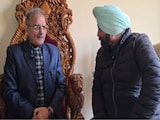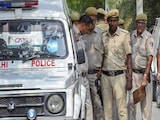Astronaut Shubhanshu Shukla is set to interact with school students and scientists at the Indian Space Research Organisation (ISRO) from his orbital post on the International Space Station via ham radio on Friday evening.
The interaction is planned via a telebridge set up at the U R Rao Satellite Centre in Bengaluru, said the Amateur Radio on International Space Station (ARISS), which facilitates interaction of school students with astronauts on the orbital laboratory.
Group Captain Shukla is on a 14-day scientific expedition on the International Space Station (ISS) as part of the Axiom-4 mission, along with three other astronauts.
The ARISS programme inspires students worldwide to pursue interests and careers in science, technology, engineering and mathematics through amateur radio-communication opportunities with the ISS on-orbit crew.
"Contact upcoming with India! @Axiom_Space #Ax4 crew member Shubhanshu Shukla, VU2TNI, will talk to the UR Rao Satellite Centre (URSC) in Karnataka via ham radio from the Space Station. Scheduled Fri. July 4 at 10:17 UTC, 6:17 AM ET, 3:47 PM ISS via K6DUE telebridge," the ARISS said in a post on X.
Ham radio, officially known as amateur radio, is a non-commercial radio-communication service operated by licensed enthusiasts and is considered a reliable mode of communication during disasters, when conventional modes of communication are not available.
Meanwhile, Group Captain Shukla was busy conducting the space microalgae experiment on Sunday.
He deployed sample bags and captured images of the algae strains in his orbital post on the ISS.
"These tiny organisms could play a big role in the future of space exploration, offering a sustainable, nutrient-rich food source for long-duration missions," Axiom Space said.
The Axiom-4 crew also collected data for the Neuro Motion VR project, where astronauts don VR headsets and perform attention-based tasks, while their brain activity is monitored using functional near-infrared spectroscopy (fNIRS).
"This research explores how microgravity affects cognitive and motor functions, which could provide valuable insight for future deep-space missions," Axiom Space said.
Data was also gathered for the Telemetric Health AI study, which integrates biometric data with mission analytics to better understand how spaceflight impacts cardiovascular and balance systems.
By applying advanced data-science techniques, the project could lead to smarter, real-time health monitoring -- both on orbit and on Earth.
(Except for the headline, this story has not been edited by NDTV staff and is published from a syndicated feed.)















